Herbivory can modify vegetation responses to climatic changes, but climate and herbivory also affect each other and rarely work in isolation from other ecological factors. Thus, it is challenging to predict how herbivory counteracts, amplifies and interacts with climate impacts. We used experimental exclosures in Norway and Canada to investigate how moose browsing can modify climatic responses of boreal trees. By modeling complex causal pathways including several climatic factors, multiple tree species, competition, tree height, time, food availability, and herbivore presence, density and browsing intensity, we found that moose can indeed counteract positive temperature responses of trees. However, this effect varied between tree species depending on moose foraging preferences. Furthermore, we found that moose can contribute positively to the growth of some trees by constraining growth of competing trees. This “cooling power” of herbivory appears to be highly context-dependent, so in order to understand its potential to prevent changes induced by warming climate, ecological complexity needs to be acknowledged.
Reference: Vuorinen, Katariina E. M., Anders L. Kolstad, Laurent De Vriendt, Gunnar Austrheim, Jean‐Pierre Tremblay, Erling J. Solberg, and James D. M. Speed (2020) Cool as a moose: How can browsing counteract climate warming effects across boreal forest ecosystems? Ecology: e03159.
You can find the full paper here.
Picture: A field site in Gaspesie (Photo by Katariina E. M. Vuorinen).

